Suchergebnisse
MasSan - Feasibility study of serial renovation concepts & models in Austria
Feasibility study to present and analyze the framework conditions and potential of serial renovations of large-volume buildings. The findings from the national pilot projects as well as the international / German projects and models are extracted and checked for their feasibility in the Austrian context and the requirements are prepared.
LehB:KlimafitDemo2+1 - Living in existing buildings today: climate-friendly renovations in existing buildings within the framework of the common good housing law
The LehB:KlimafitDemo2+1 project examines innovative renovation solutions for the climate-fit modernization of non-profit residential buildings without placing a financial burden on tenants. By implementing a flexible modular system and involving the residents, economic, technical and social aspects of the renovation are optimized. The aim is to make an important contribution to achieving climate neutrality by 2040 through adapted measures and comprehensive monitoring.
Circular Standards – Entwicklung rückbaufähiger Standarddetails
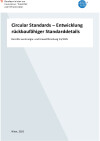
Im Rahmen des Forschungsprojektes wurde die bautechnische Konstruktion von Standarddetails bestimmt. Details wurden recherchiert, analysiert und bewertet und hinsichtlich des Parameters "Kreislauffähigkeit" (weiter-) entwickelt oder umgearbeitet. Das Ergebnis besteht in kreislauffähigen Standarddetails sowie der Identifizierung von Problemstellen und Potentialen.
Schriftenreihe
54/2025
Matthias Lang-Raudaschl, Saša Ritonja, Clemens Berlach, Arquitecta Maria Soledad Vidal Martinez, Roman Berens, Viktoriia Mikhaleva
Herausgeber: BMIMI
Deutsch, 76 Seiten
Downloads zur Publikation
TheSIS - Thermische Sanierung mit Innendämmsystemen - Untersuchung und Entwicklung von feuchtesicheren Lösungen
Entwicklung von innovativen Lösungen für die Renovierung von Gebäudehüllen mit Innendämmung mit Focus in der hygrothermischen Optimierung einer anstrichförmigen feuchteadaptiven Dampfbremse. Als Ergebnis werden die bei der Ausführung von Innendämmsystemen vorhandene Hemmnisse reduziert und damit die energetischen, komfortbezogenen und wirtschaftlichen Vorteile nutzbar gemacht.
fERNkornSAN – Dekarbonisierung und Sanierung mit erneuerbaren Rohstoffen des Gründerzeitgebäudes Fernkorngasse 41
Am Beispiel des Gründerzeitgebäudes in der Fernkorngasse 41, 1100 Wien werden technische Herausforderungen und Fragestellungen in Bezug auf den Ausstieg aus Gas und Öl sowie der Anpassung an den Klimawandel untersucht. Ein besonderes Augenmerk liegt auf ökologischen Baustoffen und hocheffizienten Technologien. Die Ergebnisse sollen als Grundlage für den Einsatz bei weiteren Projekten dienen.
ReCon: Entwicklung eines resilienten Klett-Verbindungs-Systems zur anpassungsfähigen Montage von Bauteilkomponenten im Hochbau
Systemische Auseinandersetzung mit der Klettverbindung und Bauteilschnittstellen zur Entwicklung eines resilienten Verbindungssystems zwischen Bauteil/-Komponenten unterschiedlicher Funktion und Lebensdauer. Das Ergebnis dient der Verifikation des Verbindungssystems und bildet eine Grundlage für weiterführende Erforschung und Etablierung im Hochbau.
ReCon: Development of a resilient hook-and-loop-fastening-system for the adaptable assembly of building components in the building industry
Systemic examination of the hook-and-loop fastener and building component interfaces for the development of a resilient fastening system between parts/components with different functions and lifespan. The result serves to verify the fastening system and forms a basis for further research and establishment in the building industry.
REGOreal - 100% Renewable Energy Region: Local Energy Common Good Economy in real laboratories for networked energy and mobility cells
In REGOreal, the exploration for a 100% renewable energy region in the area of Retz-Horn-Krems-Tulln (Lower Austria) and Mallnitz (Ktn) is taking place. There are four focus topics: 100 Renewable Energy Communities (REC), 1.000 building renovations, 10.000 energy exporters (in the sense of employees who carry the approach into their private environment) and 100 Mio. km of sustainable mobility with extensive use of IT for the development of local integrated energy systems (IES) to integrate a colorful mix of different actors and objects.
Lightyard - Vom Innenhof zum Lichthof
Es wurde untersucht, ob die intelligente Anordnung unterschiedlicher Materialien tageslicht-technisch optimale Lösungen für die Sanierung von Innenhöfen ermöglicht. Das Anheben der Tagesbelichtung in unteren Geschoßen auf mehr als das 10-fache ist damit realistisch. Zusätzlich wurde ein Berechnungstool konzipiert, mit dem optimierte Innenhoflösungen erstellt werden können. Dabei werden lichttechnische, wirtschaftliche und bautechnische Kriterien berücksichtigt.
Nachhaltige Sanierung und Wohnraumaktivierung einer Einfamilienhaussiedlung in Mistelbach (ReHABITAT-Siedlung)
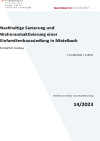
Sondierung einer nachhaltigen Einfamilienhaus-Siedlungssanierung mit ganzheitlich gedachter Nachhaltigkeitsdefinition, die beim Menschen ansetzt, auf Suffizienz basiert und auch Grün-, und Freiräume, soziale Faktoren und Mobilität mitberücksichtigt. Ergebnis ist ein integrales Gesamtkonzept auf Haus- und Siedlungsebene und eine übertragbare Herangehensweise für andere Gemeinden.
Schriftenreihe
14/2023
J. Lindenthal, J. Leitner
Herausgeber: BMK
Deutsch, 81 Seiten
Downloads zur Publikation
Subtraction as a measure to Preserve and Insulate historic Developments by Electric Robots (SPIDER)
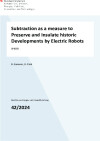
In dieser Sondierung soll das Potential von autonomen, daten-getriebenen Robotern erschlossen werden, die in einem andauernden kontinuierlichen Prozess thermische Performanceverbesserungen durch Schaffung von dämmenden Lufteinschlüssen erzielen.
Schriftenreihe
42/2024
B. Sommer, U. Pont
Herausgeber: BMK
Deutsch, 84 Seiten
Downloads zur Publikation
OWA+Quartier - Nachhaltige Sanierung und Energieversorgung für das denkmalgeschützte Otto-Wagner-Areal Richtung Plus-Energie-Quartier
Entwicklung thermischer und elektrischer Energieversorgung für das Otto-Wagner-Areal sowie von bau- und haustechnischen Musterlösungen, um die Sanierung des Quartiers in Richtung Plus-Energie-Quartier anstoßen zu können.
OWA+Quartier - Sustainable refurbishment and energy supply for the historic Otto-Wagner-Areal towards a plus-energy district
Development of thermal and electrical energy supply for the Otto-Wagner-Areal as well as model solutions for construction and building services in order to initiate the redevelopment of the area in the direction of a plus-energy district.
Fassadenintegrierte modulare Split-Wärmepumpe für Neubau und Sanierung (FiTNeS)
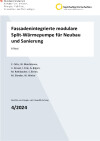
Das Ziel von FitNeS war die Entwicklung von modularen Split-Wärmepumpen mit sehr kompakten fassadenintegrierten Außeneinheiten für die Verwendung zur wohnungsweisen Heizung und Trinkwarmwasserversorgung. Einerseits soll eine modulare Bauweise mit einem hohen Grad an Vorfertigung ermöglicht werden und andererseits soll die architektonische Gestaltung und ein ansprechendes Design besondere Berücksichtigung finden. Eines der wesentlichen Entwicklungsziele ist die Minimierung der Schallemissionen durch eine optimierte Strömungsführung.
Schriftenreihe
4/2024
F. Ochs, W. Monteleone, C. Drexel, J. Fink, G. Bilgeri, M. Rothbacher, S. Breier, M. Elender, W. Winter
Herausgeber: BMK
Deutsch, 67 Seiten
Downloads zur Publikation
Vakuumglas-Kastenfenster: Performance-Monitoring in Sanierungsprojekten (VAMOS)
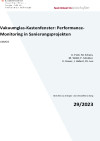
Fortsetzung und Vertiefung der Sondierung VIG_SYS_RENO zum Einsatz von Vakuumglas in Kastenfenstern für Zwecke der energetischen Optimierung von solchen Konstruktionen für Sanierungszwecke / Bestandsertüchtigung; Als Ergebnis werden vertiefte Kenntnisse über den Einsatz von hochwärmedämmenden Vakuumgläsern via Simulation und Einbau/Monitoring in Realsituation erarbeitet.
Schriftenreihe
29/2023
U. Pont, M. Schuss, M. Wölzl, P. Schober, K. Hauer, J. Haberl, Ch. Lux
Herausgeber: BMK
Deutsch, 147 Seiten
Downloads zur Publikation
ReBuildStock - Portfolio-Management zur Dekarbonisierung großer Wohnungsbestände
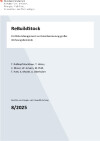
Portfolio-Managementmethode zur Unterstützung der Entscheidungsprozesse von Eigentümer:innen größerer Wohnungsbestände bei der Erarbeitung von Strategien zur schnellen und sozialverträglichen Dekarbonisierung ihrer Gebäudebestände.
Schriftenreihe
8/2025
T. Roßkopf-Nachbaur, T. Weiss, C. Moser, W. Amann, M. Ploß, T. Hatt, A. Mundt, A. Oberhuber
Herausgeber: BMK
Deutsch, 115 Seiten
Downloads zur Publikation
RENEWnow - Neue Impulse für die hocheffiziente energetische Sanierung von Geschoßwohnbauten und Quartieren
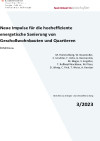
Sondierung eines innovativen Lösungsansatzes für die hocheffiziente Sanierung von Mehrfamilienhäusern in Österreich. Das Ziel ist durch einen gezielten, neuartigen Mix aus technischen und nichttechnischen Maßnahmen ein neues Dienstleistungsmodell (One-Stop-Shop) für Hausverwaltungen und Eigentümergemeinschaften zu entwickeln.
Schriftenreihe
3/2023
M. Hommelberg, W. Nussmüller, C. Urschler, F. Ochs, G. Dermentzis, M. Magni, V. Engstler, T. Roßkopf-Nachbaur, M. Ploss, D. Jähnig, C. Fink, T. Weiss, A. Knotzer
Herausgeber: BMK
Deutsch, 127 Seiten
Downloads zur Publikation
(Nudging-)Maßnahmen bei nachhaltigen Sanierungsprojekten
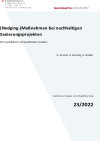
Auf der Grundlage einer soziologischen Kontextanalyse von ausgewählten Projekten der Programme „Haus der Zukunft“ und „Stadt der Zukunft“ und einer quantitativen Online-Erhebung unter NutzerInnen von Wohnobjekten werden unter verhaltensökonomischen Gesichtspunkten die relevantesten, durch Umbau- bzw. Sanierungsmaßnahmen verursachten Störfaktoren zusammengefasst und (Nudging-)Maßnahmen antizipiert.
Schriftenreihe
23/2022
K. Grosch, H. Kuschej, A. Walter
Herausgeber: BMK
Deutsch, 76 Seiten
Downloads zur Publikation
Sanierung von Gründerzeitkellern zu Wohnungen mit hoher Lebensqualität und minimalem Energieverbrauch (SPACE4free)
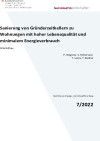
Planung von dauerhaften und schadensfreien Wohnungen mit hoher Lebensqualität und minimalem Energieverbrauch in Souterrainbereichen feuchtebelasteter Keller von Gründerzeithäusern. Durch den Einsatz von innovativen Lüftungssteuerungen wird ein behagliches Raumklima erzeugt. Gleichzeitig wird die Toleranz gegenüber unterschiedlichen Nutzungsarten gewährleistet. Ein Planungstool ermöglicht die Skalierung der Erkenntnisse und somit die Anwendbarkeit auf verschiedenste Planungssituationen.
Schriftenreihe
7/2022
P. Wegerer, S. Hinterseer, T. Lewis, T. Bednar
Herausgeber: BMK
Deutsch, 163 Seiten
Downloads zur Publikation
LehB:klimafit! Lebe heute im Bestand: Zusammen klimafit
Ziel des Projekts ist die Sondierung von übertragbaren Sanierungskonzepten für die Umsetzung von klimafitten Sanierungen in Wien. Es werden integral optimierte Sanierungspakete entwickelt, die in den Gebäudeensembles auf umsetzungswahrscheinliche, klimafitte Gesamtlösungen mit den relevanten Stakeholder:innen hin optimiert werden.
